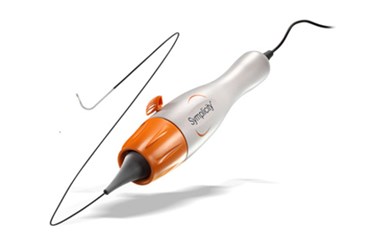Medtronic Initiates New Renal Denervation Trial
By Jof Enriquez,
Follow me on Twitter @jofenriq

Medtronic is launching a redesigned clinical trial for renal denervation, the potentially game-changing treatment for uncontrolled hypertension. The company says the new trial could finally determine the effectiveness of renal denervation compared to drugs, something an initial clinical trial last year failed to show.
The new SPYRAL HTN Global Clinical Trial Program consists of two 100-patient, prospective, randomized, and sham-controlled trials, according to a Medtronic press release. The first study, called SPYRAL HTN-OFF MED, is designed to isolate the effect of renal denervation on blood pressure reduction. The second, SPYRAL HTN-ON MED, will evaluate the effect of renal denervation on blood pressure in the presence of antihypertensive medication. Both studies will be conducted at approximately 20 centers in the U.S. and other countries.
Medtronic last year conducted its SYMPLICITY HTN-3 trial in renal denervation for treatment-resistant hypertension. However, the trial failed to meet its primary efficacy endpoint. Later analysis showed that patient adherence to a maximum dosage schedule was uneven, which made outcomes data unreliable. Medtronic says that a new, redesigned protocol will address this issue.
“Studying patients both on and off medication in a less severe and more homogenous population than we saw in the SYMPLICITY HTN-3 trial is critical to gaining clarity on the true effect of this therapy,” Raymond Townsend, M.D., director of the hypertension program at the University of Pennsylvania and a principal investigator for the upcoming trial, said in the press release.
“By specifying medication classes and not requiring maximum tolerated doses, we can expect medication variability to be reduced, which will allow for a more controlled assessment of the impact of renal denervation in the presence of medication,” he added.
Renal denervation involves inserting a catheter into the renal arteries where nerves are ablated using radio frequency pulses. By disabling the nerves, it is believed that excessive signals of the sympathetic nervous system that cause chronic high blood pressure can be controlled.
According to an article from the Minneapolis Star Tribune, medical device manufacturers like Medtronic are keen on developing the technology because uncontrolled hypertension can lead to atrial fibrillation, stroke, heart failure, and kidney failure — a potential multi-billion dollar market.
While the pivotal SYMPLICITY HTN-3 trial last year proved disappointing, Medtronic reaffirmed its commitment to the promising therapy.
“Medtronic believes the underlying science behind renal denervation is strong and that there is a clear unmet need for people with uncontrolled hypertension. Therefore, we remain committed to exploring the clinical potential of renal denervation in this population,” Jason Weidman, VP and GM, Medtronic Coronary and Renal Denervation, said in the press release.
“To get to this point, we’ve performed extensive analyses and conducted additional pre-clinical testing following the SYMPLICITY HTN-3 trial. We’ve also consulted with the FDA and reimbursement bodies, and partnered with renowned thought-leaders worldwide to develop this novel clinical trial protocol,” said Weidman.
Meanwhile, Boston Scientific has also launched its Vessix system clinical trial for renal denervation, according to the Tribune. The company plans to enroll 100 patients in a randomized, controlled study by the end of June.
